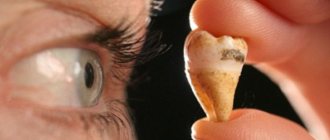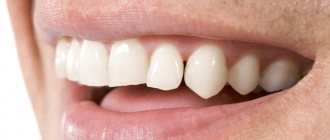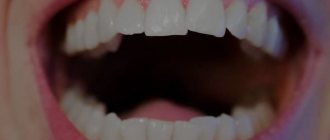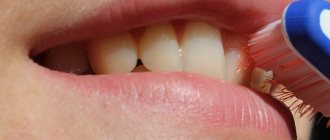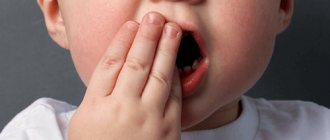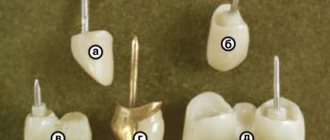When a tooth falls out, it brings not only aesthetic discomfort, but also indicates serious problems in the functioning of the body. The absence of a tooth in the oral cavity leads to changes in the bite, changes in facial features, and worsens the functioning of the stomach. Let's look at the causes of hair loss and preventive measures. The first signs of tooth loss:
- Swelling and severe redness of the gums;
- unpleasant, persistent and pungent odor from the mouth;
- excessive bleeding of the gums when brushing teeth and eating solid foods;
- changes in enamel color;
- the occurrence of suppuration of the gums.
Lack of prevention?
There is a sign: a lost tooth attracts wealth.
This concept probably dates back to childhood, when parents gave chocolates or something tasty for a lost baby tooth. Unfortunately, usually if teeth fall out on their own, this probably indicates poor oral care. This could be expressed, for example, like this:
- Brushing your teeth not every day
.
Dental statistics are terrifying: almost half of the country's population neglects daily brushing or brushes their teeth once a day. In the long term, this can lead to serious oral diseases. In extreme cases, it will be necessary to remove damaged teeth that cannot be restored, but infect neighboring ones. - Lack of
mouth rinsing after meals. The idea of the need to rinse your mouth every day after eating is still not widespread among Russians, and this is causing an increase in dental diseases. - Lack of calcium-rich foods. Calcium is the main source of strong and healthy teeth. She cannot be neglected. Teeth often become loose and fall out precisely because of a lack of calcium in the body.
What to do in these cases? First of all, resume daily oral hygiene and switch to a healthy diet. Sometimes, if the disease is not too advanced, this can help. However, you shouldn’t count on this too much and if your teeth continue to bother you, you should consult a doctor.
A tooth fell out in a dream without blood: what does it mean according to the dream book?
A lost tooth in a dream represents loss, disappointment, failure of plans. For this reason, a person unconsciously sets himself up for trouble, but there is no need to rush. One has only to remember whether there was blood in the dream. If not, you can relax a little, but do not exclude various difficulties. To know for sure what a dream promises, it is important to attach importance to absolutely all details, even the most insignificant ones. When you dream about a story in which a tooth falls out without bleeding, you should seriously think about the events taking place in life.
Physical effects
It happens that after a fight, a tooth falls out by the root. If this happens, you should not only consult a doctor, but also use the previous recommendations. After all, if a tooth falls out due to a blow, it means that it didn’t hold on well before.
Other influences also affect teeth. For example:
- Smoking
. If a smoker notices the appearance of serious problems with his teeth, this is a reason to seriously think about his health and quit smoking. Cigarettes have an extremely harmful effect on teeth and, sometimes, it is enough to get rid of the bad habit for oral problems to disappear. - Coffee
. Another food enemy of dental health. Excessive coffee consumption not only removes the natural whiteness of teeth, but can lead to other, more serious diseases. The fact is that coffee flushes calcium from the body, and it, in turn, directly affects the health and strength of teeth. Do you drink a lot of coffee? Increase your diet with foods high in calcium. - Quality of water and food
.
Remember how, as a child, you were warned not to drink tap water? Bad water, rich in harmful substances, can sometimes corrode the tooth, and in the case of a genetic predisposition, even lead to tooth loss.
What to do in these and other similar cases?
First of all, limit the harmful effects on the teeth. Stop smoking, drinking too much coffee and start boiling your drinking water. Such reasons are easily removed, since the presence or absence of harmful factors depends solely on the individual person.
However, the tooth is most likely damaged. Therefore, it is recommended to contact the Dental Clinic “Doctor-RAF” (Almaty, Muratbayev St., 101) for a FREE consultation - an initial appointment with a dentist, and, if necessary, for a repeat appointment.
Circumstances of sleep and their interpretation
Since ancient times, different peoples have interpreted night visions about tooth loss in different ways, giving them both good and negative meanings. It is worth paying attention to how this happened. Many dream books divide falling teeth into upper and lower ones. Why is there such a division? Because the upper jaw symbolizes the father and his family, and the lower jaw, respectively, the mother and all her relatives.
A dream when a sleeper loses 1 tooth without blood, portends illness and troubles. And also the subconscious can warn a person about the problems that a good friend has prepared for him. Losing one tooth with blood can tell a vacationer about the imminent death of a relative. And also such a nightly obsession warns of large financial losses, further life difficulties or a major quarrel with a loved one.
Losing two, three or more in a dream without blood and pain means changing your way of life forever, and this event will be preceded by a strong shock. If 2 or more teeth fall out with blood and unpleasant sensations, then the one who sees such a dream should be wary of shame and dishonor. Single girls should be especially careful , since such a night vision for them means sexual violence against a person.
It is noteworthy that if the sleeper sees how he lost all his teeth, and they were rotten and fell out on their own, this is a dream with a positive interpretation. For anyone who sees this picture during a night's rest, big changes for the better are coming, which will forever save him from accumulated problems and routine life in poverty.
If, for some reason, a dentist removed a tooth that had deteriorated in a dream, then in life you will have to solve problems with the help of strangers. In general, dreams about how teeth do not fall out on their own indicate that help or problems will come to the sleeper from the outside, most often unexpected.
If a person dreams that he has severe bleeding in his mouth and he cannot do anything about it, then this means cleansing through problems. Anyone who sees this will be faced with unexpected difficulties, which he will cope with quite quickly.
Age-related changes
Contrary to popular belief, age-related changes associated with tooth loss occur not only in older people, but also... in children. We are, of course, talking about baby teeth. For many parents, such age-related changes turn into a real test of fortitude. At what age do children lose teeth?
The first milk teeth fall out in children at approximately five years of age, and the last ones at thirteen, at the beginning of adolescence. True, these numbers are not accurate and there are people with very late loss of baby teeth. Don’t be afraid of this; late loss, although uncharacteristic for most people, is still not a deviation from the norm.
What to do if a child’s tooth falls out? First of all, you should plug the wound. Give him gauze to chew on and also protect damaged teeth from harm. In particular, rid your baby of spicy, salty, etc. It is enough to follow the diet for just a couple of hours.
However, if children have molars after their milk teeth, this is not the case for adults. What to do if older people lose a tooth?
First of all, follow the same diet, protecting the damaged tooth from harmful influences, and secondly, you should consult a dentist.
The VTV dental clinic performs operations to restore teeth, and if a tooth has not fallen out, but only been damaged, it can be restored with crowns. These procedures are not only absolutely safe, but can even be completely painless if anesthesia is used. The patient does not feel anything, and when oral sensitivity returns, everything is already done. The time of scary drills is a thing of the past.
Dream Interpretation Islamic
The Islamic dream book offers interpretations of the Holy Quran, in which teeth appear as symbols of the dreamer’s relatives and friends. The fangs symbolize the head of the family, the incisors of fathers and his brothers, the upper teeth - close men, and the lower teeth - relative women.
If one of the teeth is missing in the mouth, the family may be reduced by one person. Please note that according to the Islamic Dream Book, seeing yourself without teeth in your mouth is a good sign ; such a dream promises the dreamer a long life and warns that he will be the last to die.
Recommendations for everyone
Are there any general recommendations that are effective in all cases?
Yes, I have. The first and most important thing is not to panic. Usually, tooth loss is accompanied by panic and surprise. Especially if an unpleasant event occurred during a meal or during another event, when nothing foreshadowed trouble.
When panicking, a person makes mistakes that will still have to be corrected later. Therefore, the first and most important recommendation is not to panic.
The second recommendation is to trust dentists. It is better not to self-medicate, but to turn to specialists. Let them examine, make a diagnosis, and do everything necessary to keep your mouth healthy. After all, health is not something that can be entrusted to amateurs, not professionals.
Otherwise, healthy teeth and may none of the readers ever need dental services.
Why teeth fall out in adults and children.
Tooth loss is a bad sign that most often causes anxiety in people. The problem is, of course, serious, but it also has various solutions.
Children and adults
Lost teeth in a child aged 6–8 years is a natural process of changing milk teeth to permanent ones. Most often, the baby loses them in the same order in which they erupted. There is no exact age when this happens, since this condition is individual for each baby, but it happens absolutely painlessly and is safe for the body.
However, if a tooth falls out in adulthood, this is a sign of a serious pathology, which is most often associated with poor hygiene, bad habits and resulting diseases. Delayed treatment and negligent attitude towards teeth care can lead to their loss.
In turn, an incomplete row leads to displacement of the teeth: they move closer together, as if filling the resulting gap. This state of affairs can lead to the following consequences:
- the bite is disturbed;
- cracks form;
- teeth become loose;
- periodontitis develops.
Absence of teeth leads to displacement of the remaining ones and the formation of gaps
There is a misconception that older people always start to lose teeth, but this is not true. The process has nothing to do with age. Teeth can be kept healthy and strong if you take proper care of them, take vitamins, give up bad habits and visit the dentist regularly.
Many mothers wonder which teeth fall out first. Depending on the child’s body, milk falls out at 6 or 7 years of age. The baby loses them in the same order in which they erupted; for example, you can see that the front tooth has fallen out if it erupted first. If the lower incisors erupted first, they will be the first to leave their place.
What options for dental prosthetics exist besides implants?
The integrity of the dentition can be restored in various ways - mainly by installing dentures, removable or fixed. Today, there are many options for prosthetics based on a variety of materials and designs. Let's look at some analogues of dental implantation.
Removable prosthetic structures
Removable dentures are popular because... They allow you to replace all missing teeth (full dentures) or several (partial dentures). In addition, they are relatively inexpensive, have good aesthetics, do not require surgery for installation, have a minimum of contraindications and are quite easy to replace.
Lamellar dentures
They can be either full or partial. Made from acrylic and other polymer materials. These dentures are solid. They are fixed either by “suction” to the gums (full dentures), or by fixing them to adjacent teeth using special clasps (partial dentures). The advantages of such prostheses include affordable prices, the possibility of easy replacement and repair. The disadvantages are the difficulty of getting used to, not very reliable fixation (especially for complete dentures), chafing, injury to the gums, inability to chew solid food, short service life - from 2 to 7 years.
Flexible prostheses
They can also be complete or partial. They are made from nylon and other softer materials (Acry-free). Therefore, the advantages include smaller sizes (compared to plate ones), greater elasticity, faster adaptation, less chafing and injury to the gums. Disadvantages - they are often deformed (due to stretching of the base), chewing hard food causes pain. Service life is from 3 to 8 years.
Clasp dentures
These dentures are suitable for replacing only a few missing teeth. They must be fixed to the supporting teeth using special locks, hooks or telescopic crowns. Their key feature is a metal arc that connects all elements and evenly distributes the chewing load. Currently, biotechnological clasp dentures (without the use of metal) are also used. The service life is considerable - 7-10 years. But at the same time, such a prosthesis requires support on healthy teeth, which experience increased stress and often collapse faster because of this.
Common disadvantages of removable dentures are:
- violation of diction,
- insufficiently reliable fixation,
- dietary restrictions,
- special hygiene requirements,
- atrophy of bone tissue at the site of lost teeth,
- the need for periodic replacement.
Nevertheless, removable dentures are a good alternative to dental implantation due to their low cost, fairly quick adaptation, the possibility of self-removal and installation (for some models), and the absence of the need for serious intervention (gum incisions, etc.) during installation.
Bridges
Fixed dentures are used to restore several missing teeth in a row (1-4). A bridge is a solid structure of several crowns installed on the outer teeth. The main advantages of this alternative to dental implantation are excellent aesthetics, structural strength, resistance to stress, and perfect diction. But alas, not everything is so good, there is a fly in the ointment:
- bridges are not suitable for complete edentia (lack of teeth) and terminal defects due to the absence of supporting teeth,
- the need to grind abutment teeth for crowns,
- A bridge does not stop bone atrophy.
Otherwise, this is a great way to restore a charming smile with the help of beautiful and durable zirconium or ceramic crowns, which will also cost less than implantation.
Combined prosthetics
By combined prosthetics it is more correct to understand complex designs of prostheses in which the removable part is installed on a non-removable base. Remaining healthy teeth are used to secure fixed elements. The removable part of the prosthesis is attached to them with clasps, telescopic crowns or attachments. It is a rather complex alternative to dental implantation. Its advantages and disadvantages are similar to those for fixed prosthetics.
Mini implantation
Often this method of prosthetics is used in cases of complete absence of teeth. For reliable fixation of the prosthesis, mini-implants are used - up to 2.5 mm in diameter, shallowly immersed in the bone. They have tops in the form of spherical abutments, to which the base of the prosthesis is attached. Mini-implants are cheaper than full-size models and take root easier and faster.
But firstly, this is still implantation, so for those who have absolute contraindications, this method is not suitable.
And secondly, their fixation and strength are lower than those of conventional implants, so they are used with serious nutritional restrictions in order to reduce the load on the locking mechanisms and the implant body.
Orthodontic treatment
In some cases, it is possible to move existing teeth to correct the defect. But this option is only possible if the bone tissue is in good condition and after a thorough diagnosis. Unfortunately, the method is not omnipotent; it has contraindications, requires long-term wearing of braces and does not guarantee an ideal result.
A child’s baby tooth has fallen out - what to do?
So the moment came when the child’s baby tooth fell out. Quite often the wound may bleed. In such a situation, the main thing is not to be scared, because the excitement can be passed on to the child. Minor bleeding does not pose any threat to the baby's health. It is due to the fact that in the oral cavity there are a large number of small blood vessels that bleed at the slightest damage.
Therefore, sometimes the birth of a permanent tooth is observed when the baby tooth has not yet fallen out. Also at this time, an expansion of the gap between the teeth occurs, which causes loosening and tooth loss.
From a medical point of view, the loss of teeth can ultimately lead to stomach and digestive diseases, since food will become less chewable, irritate the walls of the stomach, be poorly digested, and enter the esophagus insufficiently processed.
Among other things, the presence of an empty cavity in the mouth deprives the teeth adjacent to it of the opportunity to lean against each other, thereby maintaining stability. And it doesn’t matter whether a molar or a front tooth falls out, because both can become loose from lack of support. And if proper measures are not taken, the loss of new teeth will be inevitable. And their loss can lead, in turn, to the development of various pathologies of the oral cavity. There is only one conclusion: something needs to be done about the loss...
If this is not done, the tooth will be subject to further destruction. Constant pressure will expand the resulting hole. In an untreated tooth, caries will penetrate much deeper.
You should immediately go to the hospital if your false teeth fall out. Perhaps the dentures were simply installed incorrectly.
Why do adults lose teeth?
In most cases, loss is associated with diseases such as:
- hypertension;
- rheumatism;
- arthritis;
- diabetes;
- gum disease;
- suffered severe stress;
- periodontitis;
- injuries and fractures.
If the cause is illness rather than injury, the process occurs gradually. Loose teeth and severe bleeding gums should alert anyone and be a reason to see a dentist. In some situations, if you contact a specialist in a timely manner, the destruction can be stopped.
The most common reason that a molar tooth falls out is periodontitis, an inflammatory disease.
It has the following symptoms:
- bleeding gums;
- inflammation and swelling of the gums;
- purulent inflammation;
- loose teeth;
- enlargement and pain in the lymph nodes under the jaw;
- viscous saliva;
- severe plaque formation;
- bad breath;
- row offset;
- dropping out.
- The formation of microorganisms in the oral cavity, which lead to the formation of plaques.
- Diabetes, weakened immunity, diseases of the circulatory system, chronic pathologies.
Periodontitis occurs due to the appearance of tartar, poor oral hygiene, and smoking. To treat it, a surgical method is used that helps eliminate the pathological gum pocket and remove hopeless teeth to preserve the bone of the alveolar process. It can subsequently be used for dental implantation.
In the process of treating periodontitis, antiseptics and anti-inflammatory medications, essential oils, and various methods of professional cleaning are used. Physiotherapy is widely used, and vitamins are prescribed to strengthen the immune system.
A tooth fell out - what to do?
Preventive measures should begin from infancy. The condition and integrity of the molars largely determines how permanent teeth will appear.
In order to maintain the integrity of the oral cavity until old age, it is necessary to carry out regular preventive measures.
Traumatic lesions of molars
Children and adolescents are very often exposed to various injuries due to their pronounced mobility. Therefore, for several years after teeth erupt, their tissues will continue their maturation process, so there is a very high risk of tooth damage from impacts and falls. Children often come to the dentist for an appointment because their teeth have chipped, broken or cracked, even after receiving a minor injury.
If even a small piece of a tooth breaks off, it needs to be corrected. Often, missing dental tissues are augmented with composite materials.


